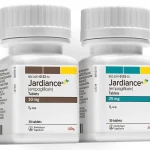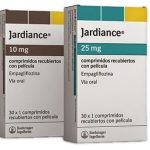What Foods To Avoid When Taking Jardiance

Jardiance is a brand name for a medication called empagliflozin. It belongs to a class of drugs known as sodium-glucose cotransporter 2 (SGLT2) inhibitors. Jardiance is commonly prescribed to manage type 2 diabetes.
Jardiance works by 3 mechanisms namely:
1. Inhibition of SGLT2: In the kidneys, there are glucose transporters called sodium-glucose cotransporters (SGLT). SGLT2 is responsible for reabsorbing glucose back into the bloodstream. Jardiance specifically inhibits SGLT2, reducing the reabsorption of glucose in the kidneys.
2. Increased Urinary Glucose Excretion: By inhibiting SGLT2, Jardiance promotes the excretion of excess glucose through urine. This mechanism helps lower blood glucose levels, as the body eliminates more glucose rather than reabsorbing it.
3. Lowering Blood Sugar Levels: By reducing the amount of glucose reabsorbed in the kidneys and increasing urinary excretion, Jardiance helps lower blood sugar levels in people with type 2 diabetes.
4. Additional Cardiovascular Benefits: In addition to its glucose-lowering effects, Jardiance has shown cardiovascular benefits in clinical trials. It has been associated with a reduction in the risk of major cardiovascular events, including heart attack and stroke, in people with type 2 diabetes and established cardiovascular disease.
It’s important to note that Jardiance is typically used as part of a comprehensive treatment plan for type 2 diabetes, which may include lifestyle modifications, diet, exercise, and other medications. Jardiance primarily acts on the kidneys to decrease glucose reabsorption, leading to increased urinary glucose excretion. This mechanism helps lower blood sugar levels in individuals with type 2 diabetes. While Jardiance is effective, dietary choices can significantly influence its outcomes.
Foods High in Refined Carbohydrates and Sugars
1. Sugary Snacks and Beverages
• Candies, cookies, and cakes: Foods high in refined sugars can cause rapid spikes in blood sugar levels, counteracting the glucose-lowering effects of Jardiance.
• Sodas and sweetened drinks: These beverages contribute to increased calorie intake without providing essential nutrients and can lead to unstable blood sugar levels.
2. White Bread and Pastries
• Foods made with refined flour, such as white bread and pastries, can lead to a rapid increase in blood sugar. Opt for whole-grain alternatives that offer more fiber, which can help stabilize blood sugar levels.
3. Processed Foods
• Many processed foods contain hidden sugars and high levels of unhealthy carbohydrates. Carefully read food labels to identify added sugars and opt for whole, unprocessed foods whenever possible.
High-Glycemic Index Fruits
While fruits are generally a healthy part of a balanced diet, some have a higher glycemic index, causing a quicker spike in blood sugar. Moderation is key, and it’s advisable to choose fruits with a lower glycemic index, such as berries, cherries, and apples, while limiting intake of high-glycemic fruits like watermelon and pineapple.
Starchy Vegetables and Legumes
1. Potatoes and Corn
• Potatoes, especially in their processed forms like fries, and corn can lead to rapid increases in blood sugar levels. Choose non-starchy vegetables like broccoli, cauliflower, and leafy greens as alternatives.
2. High-Starch Legumes
• While legumes are generally a good source of protein and fiber, some, like baked beans and certain lentil varieties, can be higher in carbohydrates. Be mindful of portion sizes and consider pairing them with non-starchy vegetables.
High-Fat Foods
1. Saturated and Trans Fats
• Foods high in saturated and trans fats may contribute to insulin resistance and negatively impact heart health. Limit intake of fried foods, processed snacks, and fatty cuts of meat.
2. Excessive Dairy Fats
• Full-fat dairy products, such as whole milk and high-fat cheeses, can be sources of unhealthy fats. Opt for low-fat or fat-free dairy alternatives to support heart health.
Alcohol
While moderate alcohol consumption might be acceptable for some individuals with diabetes, excessive intake can lead to fluctuations in blood sugar levels. Additionally, alcohol can interact with medications, including Jardiance, potentially causing adverse effects. It’s crucial to consult with a healthcare professional to determine the appropriate level of alcohol consumption based on individual health status.
Considerations for Meal Timing and Jardiance
Beyond specific food choices, the timing of meals can influence the effectiveness of Jardiance. Since this medication increases urinary glucose excretion, staying hydrated is essential to prevent dehydration, a potential side effect. Distributing food intake throughout the day, rather than consuming large amounts in one sitting, can help balance fluid levels and enhance the medication’s efficacy.
Individualized Dietary Planning with a Healthcare Professional
While general guidelines are valuable, the impact of foods on blood sugar levels can vary among individuals. Consulting with a registered dietitian or healthcare professional is crucial for developing a personalized and sustainable dietary plan. These professionals can consider factors such as individual health status, preferences, and lifestyle to create a comprehensive approach to diabetes management.
Monitoring and Adaptation
Regular monitoring of blood glucose levels is essential for individuals taking Jardiance. This allows for timely adjustments to the treatment plan, including dietary modifications. Understanding how specific foods affect blood sugar levels empowers individuals to make informed choices and maintain better control over their diabetes.
Conclusion
Incorporating Jardiance into a diabetes management plan is a positive step toward achieving optimal health. However, it’s equally crucial to recognize the symbiotic relationship between medication and lifestyle choices, particularly dietary habits. By avoiding or moderating certain foods that can counteract the effects of Jardiance, individuals can enhance the medication’s efficacy and improve overall diabetes management.
Balancing a nutrient-rich, low-glycemic diet with regular physical activity, adequate hydration, and proper medication adherence forms the foundation of a holistic approach to type 2 diabetes management. Embracing this multifaceted strategy empowers individuals to take control of their health and foster positive, sustainable habits for long-term well-being.





